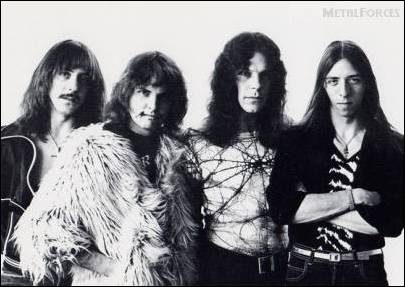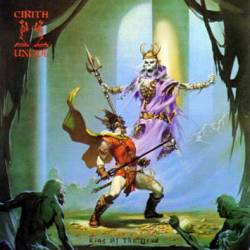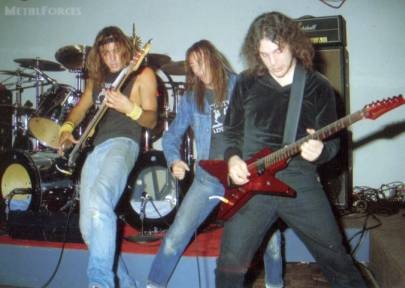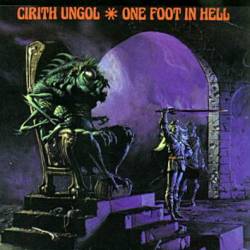

|
Bass parts on Frost And Fire were actually handled by Greg as well. “It was kind of a weird situation because we had already laid down the tracks if I remember right, and at the same time we recruited Flint (Michael Vujea, bass until 1987) from another band,” Tim clarifies. “We’d known him for a while. We’d played gigs together with the band that he used to be in, and we always liked his bass playing. We’d say ‘Hey, someday we’re gonna steal you away.’ Greg really wanted to play guitar – I guess nobody really wants to play bass (laughs). We thought ‘We need a bass player right now. We’ve got two guitar players, Greg and Jerry.’ At the time Flint didn’t really know the songs that well, and with Greg – like I said – they were basically all his songs, because he had written them and played them. That’s how that evolved. As for Flint though, he’d been playing the songs for a while before the record came out and he played just as well as Greg, if not better. There was no harm in putting his name on there, and nobody else had any issues with it either. It could’ve been either him or Greg that played, and it would’ve came out just as good. That’s how that came about.”
“Greg was always a good guy,” Rob compliments. “Even though he left the band… I feel badly about every guy that left the band and I have all sorts of regrets and ill feelings, but Greg was cool. He played on the album but Flint was our bass player, so he goes ‘We’ll credit him on the album.’”
“No harm, no foul,” Tim reckons.
“And Greg did some pretty radically bass things on ‘Better Off Dead’ and stuff,” Rob feels. “There’s some cool bass stuff on there but for anyone who doubts Flint’s playing ability, if you listen to the bass intro on ‘Master Of The Pit’ on King Of The Dead then you’ll hear a lot of his good bass playing.”
Fantasy cover artist Michael Whelan designed the artwork for Frost And Fire, a relationship which lasted through all four of Cirith Ungol’s studio affairs. Later on, Michael designed artwork for groups like Sepultura, Soulfly, Obituary, Evile, and Meat Loaf. “We wanted to put out a record, and had already finished recording,” Rob tells. “The cover that I wanted actually was… I liked fantasy literature; we were reading a lot of Conan The Barbarian (by Robert E. Howard), and Elric (Of Melniboné) by Michael Moorcock – a famous English author. We were reading all this sword and sorcery fantasy stuff, and once again, Greg was a guy who’d go ‘Read this book.’ He’d hand me Stormbringer (1965, Michael Moorcock) or something like that, and I’d read it and be like ‘Wow, this is unbelievable.’ I was reading all the Conan books, and one of the Conan books had a cover by Frank Frazetta called Berserker. It shows a guy on his horse, and he’s jumping over all these dead bodies. He’s got a sword over his head, and he’s like a half-goblin monster guy. We go ‘Wow, this is really cool,’ but almost at that very exact same time a band in the United States – some Southern rock band called Molly Hatchet – came out with this cover (for September 1980’s Beatin’ The Odds, Hatchet’s third album). We’re like ‘Oh damn, that’s what we wanted.’
“We never contacted the guy so we never really knew how to get hold of him, but we were saying ‘If we could use this, this is what we would use.’ In fact, one of our influences – the band Dust that was from New York – had one of Frank Frazetta’s pictures (Snow Giants) of three giant dwarf trolls or something fighting on top of a mountain in the snow. That was on their second album Hard Attack (1972) and that was from the same painter, and we were going ‘This is cool.’ After Molly Hatchet came out with that album, we were going ‘Hey, what are we gonna put on here?’ I was reading Stormbringer and I’m looking at this going ‘Man, this is better than anything we could ever use,’ so I wrote to a publishing company and they put us in touch with Michael Whelan.”
“Nobody had asked him to do a cover up until that time, which is kind of amazing because his stuff was so great,” Tim exalts.
“He was mainly doing book covers,” Rob informs. “Horror books like H.P. Lovecraft, and he did almost all of the original Moorcock books. They’re pretty amazing paintings, so we actually made friends with him. I kind of feel bad for Michael because, once again, our hope for us was to become really big and famous, and all these people that had supported us and stood by us… He had the actual painting for Stormbringer, and I said ‘I wanna buy that.’ He said ‘I’m gonna hang onto it because it’s my favourite painting.’ I go ‘Someday when I’m rich I’m gonna pay you whatever,’ and goes ‘Don’t worry. Okay.’ We never made it big though. Him allowing us to use his paintings on our records I think really helped the band, and I believe that actually they fit our music. It’s not like he was giving us any kind of charity or anything, but I don’t think we ever compensated him thoroughly for the paintings that he allowed us to use.”

|
Greg Lindstrom departed in 1982, Cirith Ungol becoming a quartet. “Greg was a really smart guy who wanted to be an engineer,” Tim reveals. “That’s what he is today – he’s an engineer. He was going off to college, and we were going in a different direction. We wanted to play a little bit more heavier stuff, so it was kind of a good time for it to happen. He went to college, and we just reformed, regrouped and got on with it, and got heavier and better as the years went on.”
“When he went away to college it wasn’t that far away,” Rob notes. “We still practised every weekend, but his influences were changing. At the time that new wave stuff was coming out. I’m not gonna insult Greg by saying he was listening to new wave music because he wasn’t, but there were a bunch of bands that were coming out.”
“Even if you listen to Frost And Fire, some of the stuff has a lot of weird synth keyboards and quirky stuff,” Tim judges. “It kind of reminds me of The Cars or something, and I didn’t wanna be The Cars (laughs).”
“We also wanted to move to Los Angeles,” Rob acknowledges. “I’ll tell you: one of the reasons we never made it big was because we didn’t live in Los Angeles. We’re like around an hour up the coast, and I like to try to tell people we’re the last civilised outpost before you get to Los Angeles. I don’t know if you’ve been to Los Angeles, but Los Angeles is like a giant city that maybe stands a 1,000 square miles – you can drive for days without seeing a tree. There’s a lot of rich people and a lot of nice areas, but it’s also so large and so congested and confusing, and back then really polluted and stuff. It was kind of creepy. We live right on the ocean, and we’re around an hour north of there. There’s trees, hills. There’s not that many people living here; there’s fresh air.”
“As far as playing and stuff, there’s a lot of people competing for the same slots at all the clubs down there,” Tim expounds. “Actually for a time, the clubs down there – the Whisky A-Go-Go, the Troubadour, the Starwood, and all these clubs – would encourage you to play. They would make you pay in advance for your slot to play, and they would make you sell tickets. If you didn’t make your money back, then that was just tough shit. That was kind of a turn off for a lot of bands, too. I think they changed their policy now because they figure they’re gonna make money anyway from drinks or whatever, but it was just outrageous at the time. All these bands were fighting for the same little slots, and these guys were holding this over your head that you had to come down and pay to play. You’d play on a Wednesday night at two in the morning and bring a bus load of your people down, and you wouldn’t get paid. It was just really outrageous. We made it down there a lot of the time to play gigs and stuff, but it was kind of tough to do.”
“That was coming in right near the end of our career, the pay to play thing,” Rob observes. “The way we got jobs was you’d go down there and hang out, and you’d try to get backstage and talk to the booking agent. You’d give him a cassette, and try to explain to him ‘Hey, we’re this big band. We’re playing all these shows and stuff. Will you let us play?’ We got to play some pretty good shows; we played the Roxy, we played the Starwood which was that famous place from the movie Wonderland (2003). But I’m not kidding, to get in there wasn’t easy. You’d spend six months courting these guys almost like you were gonna marry them just to get a gig, and then we’d have to print up posters and tell everyone, and a lot of people would come to our shows. A lot of people look at the last video on the web of us playing here in our hometown, but that was the last show we played and the band was breaking up. There were only a few people there, but most of the shows we played in Los Angeles were in small clubs and they were packed to the guilds.”
July 1984’s King Of The Dead – Cirith Ungol’s sophomore album – is generally viewed as their greatest. “That’s the general consensus of most people, and most of our fans,” Tim agrees. “It’s got a lot of good stuff on it. Yeah, I like all of our albums and they all have some great stuff on them. Really, any of them with Jerry Fogle on them are great, and Jimmy (Barraza, guitars from 1998 until 1992) too. Most people are in consensus that this is our best album, and there’s some really good stuff on there. You can’t deny how great ‘Master Of The Pit’, ‘King Of The Dead’, and ‘Finger Of Scorn’ are. There was a new energy in the band with Flint and everything, and we decided that we wanted to do what we wanted to do, which was get really heavy and epic. I think that came across on King Of The Dead, and that’s why people still love it to this day.”
“I go on Amazon and write reviews – small ones – but I try to make them really truthful, and here’s what I like about King Of The Dead,” Rob begins. “My parents actually loaned us some money for it which we paid back, and once again my poor mom is really sick. She may not make it much longer and my dad’s gone, but if they hadn’t paid for that album we couldn’t have done it. We paid for it, we produced it, and we mixed it. I don’t know if you’ve heard the stories about Paradise Lost (August 1991, Cirith Ungol’s fourth and final studio album), but on Paradise Lost each member wasn’t even allowed to be in the recording studio while the other guys were recording. On King Of The Dead every night all of us would go down there, we’d listen to the tapes, and do guitar overdubs. Tim would sing along and we’d go ‘Yeah man, that’s great,’ or Jerry would play a guitar riff and we’d go ‘Oh, that don’t sound good.’ He’d redo it, and we’d go ‘Oh, that’s really great.’

|
“It was the first and last album that we had a 100% control over because we paid for it, we recorded it, and we mixed it. There was no-one telling us what to do. Getting back to Jerry, Jerry has passed away now but I tell everyone this, and this is what I want people to do. If you listen to King Of The Dead then listen to the double lead guitar solo on ‘Cirith Ungol’, the song named after the band. That to me is Jerry’s finest hour, where he’s playing two leads intertwined and there’s so much emotion involved. Once again, that’s why I liked Mountain and bands like that. It wasn’t how fast Leslie West played the guitar, but how much feeling he put into every note and guys like Jerry. I know Leslie West was one of his heroes, but if you listen to those kinds of guitarists it’s almost like it’s singing like a person. Once again it’s not how fast he played or maybe even how perfect he played, but it’s how much emotion that travels from the musician into the music.”
“I think that’s what people get out of King Of The Dead too, that they can feel all that passion and everything that we put into it,” Tim guesses. “I think that’s why it’s a lot of people’s favourite. Frost And Fire was never supposed to be an album, so it was a conglomeration of things at the time that we thought would be more of a commercial effort to get a record deal. Like Rob just said right there, King Of The Dead was a group effort that we really felt passionate about. We wanted to show people ‘Screw all this commercial crap; let’s do the heaviest thing that we can do, and the best thing that’s ever been done.’ That’s King Of The Dead.”
Third outing One Foot In Hell arrived in August 1986, the only Cirith Ungol studio affair to be originally released by Metal Blade Records. “Great,” Tim proclaims of One Foot In Hell. “I like it. It’s a bit different than King Of The Dead. I think we had matured a little bit by then, and kind of had it down a little bit. It’s a little bit heavier and faster, I think. I don’t know why. It was just the way we felt like playing at that time. By that time Flint had been in the band for a while, and we were all really involved in doing the songwriting together.
“I think it’s got some really good stuff on it, some really crazy guitar stuff from Jerry, stuff like ‘War Eternal’ with a long freaking double guitar solo in it. As a matter of fact, during the recording process it must’ve taken weeks to do some of this stuff because Jerry would be in there just doing leads, leads, and leads and we’d just be going ‘Yeah, yeah, yeah. Do more.’ It would just take forever to do some of that stuff. I think it’s a great record too, and I actually listen to it all the time. Some of my favourite stuff is on there; me and Rob wrote ‘Doomed Planet’ together and that’s one of my favourite songs, especially some of the vocal work on it – Rob doing the crazy background stuff with me. There’s some great songs on that album; we’d start off concerts with ‘Blood & Iron’, so it’s one of my favourites. The artwork on the album is obviously great, too. All those covers by Michael Whelan are just fantastic, and I’m sure a lot of our fans had no idea who he was. Maybe someone was sifting through the record bin and came across something like that, a giant fly-god sitting on a throne while a guy is hitting him with a glowing sword. It’s like ‘Geez, I’ve gotta hear what’s inside of this.’”
“We wrote ‘Doomed Planet’, so when the planet is over we want credit for that,” Rob chuckles. “We signed with Brian on that one. I’m not really sure what happened, but for some reason we did that on Metal Blade and I don’t know why we didn’t go back to Metal Blade after that – whether they didn’t want us, or whether we didn’t sell enough records. I agree though, I like it. The music is as good as King Of The Dead, but I don’t think it sounds as good. I think some of that could be attributed to… When we recorded King Of The Dead we had all the time that we needed, and we actually went down to Los Angeles to a bigger recording studio.
“Getting back to Martin Popoff’s book on these bands, I’m reading about some of these things about MC5 or whoever… They go ‘If you record the album and don’t like it, we’ll do it over,’ and so they record it and say they don’t like it, but they go ‘Well, it’s a wrap.’ We went down there and threw down some basic tracks, and once you do that you can’t really go back and change them. Once again, I hate to keep going back on this book because Tim hasn’t read it yet… With Captain Beyond on their first album, they had an engineer that had never been an engineer before. They recorded the whole album out of faith, and so they had to spend thousands of dollars trying to get it to sound good. We didn’t have any of those really, really bad problems, but once you record a basic track you can’t go back and change anything to it. I agree with Tim though, that some of the best guitar work’s on there.”

|
Perhaps a remix of One Foot In Hell would alleviate grievances with the album’s sound. “Metal Blade has the original tapes for that,” Rob responds. “I have all the original tapes for the first two albums, and Brian has the original tapes for One Foot In Hell. That’d be something they’d have to do. I do know this… We did have some experimental background vocals that didn’t make it on there, and they were pretty wild and I didn’t want to see them disappear. Brian did the final mix on that though; I’m not really unhappy with it, and I think every album has its own tone to it. I like King Of The Dead the best. I’m not picking on our other records but it stands out as the one I feel the proudest of, and maybe that’s because I feel like all of us as a group had the most to do with it. Once again, once we signed with Brian on Metal Blade and you bring in a record company and other people, there are more cooks working on the recipe. It doesn’t mean that the end results aren’t good, but just means that it takes less of the actual personality of the band and colours it with different influences.”
Swansong effort Paradise Lost saw the light of day in August 1991, though recording sessions didn’t run smoothly. “That was horrible,” Rob deplores. “We had a producer (Ron Goudie), and you can look on the record for his name – I don’t wanna really say bad stuff about people – but it took so long to do that we actually lost some members and that was horrible and stuff. Once again, on Servants Of Chaos there’s a copy of ‘Fire’ and a copy of ‘Fallen Idols’ that we did in our regular studio as a demo. That was to, once again, try to get big record companies interested in Paradise Lost. If you listen to those, I think the whole album would’ve sounded more like that than it did the way it came out. I was taken into the studio with a click machine and I played all the drum tracks to no music, just me humming the songs in my head to a metronome.”
“That’s no way to make a metal album,” Tim insists.
“It’s like taking Van Gogh, giving him a ruler, and putting a scarf over his head so he can’t see,” Rob surmises. “His lines are all gonna be straight, but that’s not the point. The point with this producer was your drumbeats have to be perfect and perfectly aligned with the computer, and to me that takes away. So anyway, that ruined the whole album for me. The guitar parts none of us listened to, Tim singing none of us heard. I actually cried when I heard the album for the first time. It wasn’t bad. We kind of felt upbeat because at least we had another record out, but I look back on it and what destroyed that album was the way we recorded it. Once again, we had a producer tell us how to do it. I mentioned this in another interview… Every time I complained ‘You know what? This is bullshit. I’m not gonna do this.’ The guy said ‘Well, we can just cancel the whole deal right now.’ That was the alternative; either do it their way, or you aren’t gonna do it. The best part on that is probably Jimmy’s guitar playing. Jimmy did some unbelievable guitar stuff on there.”
“It’s really a tragedy that things didn’t work out with Jerry, because our original plan was to have Jimmy and Jerry in the band together,” Tim concedes. “It’s too bad that that never really worked out; that would’ve been frickin’ awesome.”
Related Posts via Categories
- CIRITH UNGOL – Kings Of The Dead, Part One (January 2012) | Features / Interviews @ Metal Forces Magazine
- CIRITH UNGOL – Kings Of The Dead, Part Three (January 2012) | Features / Interviews @ Metal Forces Magazine
- SCOTTISH SICKNESS – A Report On The Scottish Death Metal Scene, Featuring BRAINBATH, PUTRID FATE And RANCID CADAVER (October 2022) | Features / Interviews @ Metal Forces
- LARVAE – Join The Hardcore Cult! (June 2022) | Features / Interviews @ Metal Forces Magazine
- TRENCH FOOT – Sacrificing Morals For Gory Obscenities (June 2022) | Features / Interviews @ Metal Forces Magazine
- L.A. GUNS – Trigger Happy (March 2019) | Features / Interviews @ Metal Forces Magazine
- CANCER – Crimes So Evil (November 2018) | Features / Interviews @ Metal Forces Magazine
- U.D.O. – The Tank Drives On (August 2018) | Features / Interviews @ Metal Forces Magazine
- SIEGE OF POWER – Bleeding For The Cause (August 2018) | Features / Interviews @ Metal Forces Magazine
- MOONSPELL – A Taste Of Live Eternity (August 2018) | Features / Interviews @ Metal Forces Magazine
|
|





